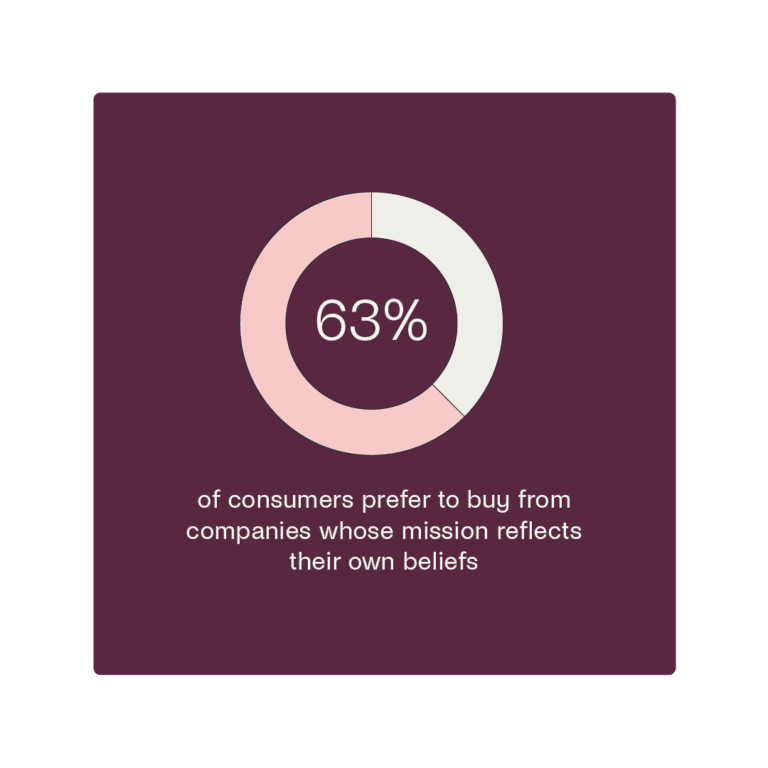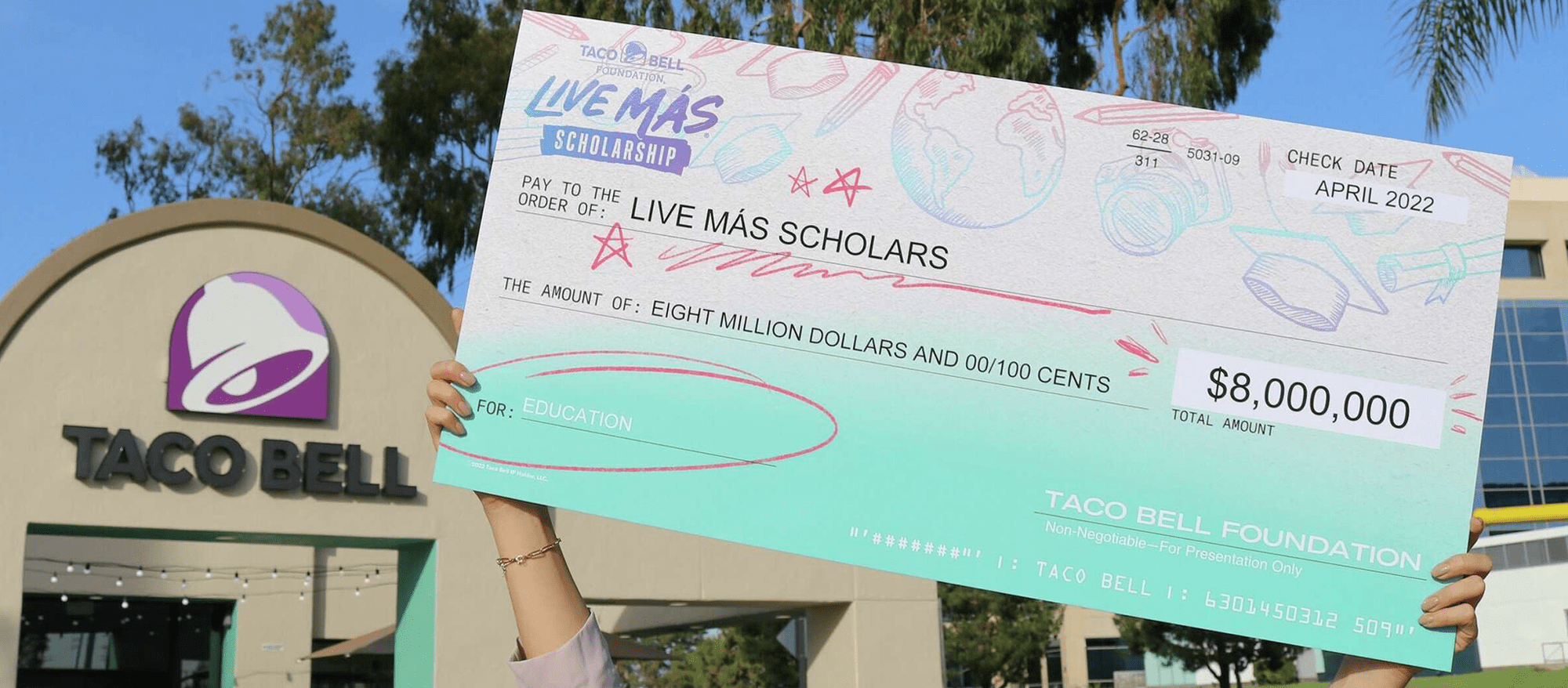When you think of channels and tactics used to grow businesses and brands, you may think of advertising, social media, events, etc. Creating a scholarship program is likely not an option that you would think of, but it definitely should be considering the benefits of hosting a scholarship. In this article, we’ll discuss 10 ways businesses can use scholarship programs to better understand their audience, improve their reputation, and maximize the good they do.
1. Stress your mission
When an organization aligns business practices with its mission, employees and stakeholders can be unified towards a central purpose, building trust and confidence in the business. This can have tangible benefits for employee motivation and retention as studies have shown 54% of mission-oriented employees are likely to stay with an organization for five years or more.
Scholarships can often be a strong way for organizations to put their mission at the forefront of their identity. For example, Bristol Myers Squibb’s Scholarship for Cancer Survivors ties back to the company’s mission to “discover, develop and deliver innovative medicines that help patients prevail over serious diseases.”
2. Demonstrate your values and better manage your brand reputation
Similarly, an organization’s values define its culture and reputation. Your values also matter to your consumers. 63% of consumers would prefer goods and services from companies that align with their own values and beliefs. This impact can be seen on the bottom line, as companies that act on their values can see up to a 60% better return for shareholders than the median.
An organization’s values should align to the needs of the market it serves. Providing a scholarship is another way to demonstrate commitment to those values. For example, Toyota’s Teen Drive 365 Program awards teens who create PSAs about driver safety, demonstrating their dedication “to providing clean and safe products and to enhancing the quality of life everywhere through all of our activities.”

3. Drive brand awareness
As marketing and advertising have become more competitive, traditional channels and approaches are diminishing in value. There’s an increasing need for brands to differentiate themselves from competitors and standing on social values can be a strong way to define a brand’s identity. Companies that support education through scholarships can garner positive brand recognition and convert otherwise apathetic consumers into evangelists.
4. Boost employee retention through enhanced benefits
As the availability of jobs that don’t require higher education shrinks, the cost of education continues to rise and employers are increasingly struggling to hire qualified candidates. In a survey of business executives, 87% reported that their businesses were struggling due to skills gaps, but less than 50% had a clear idea of how to address the problem.
Offering scholarships or tuition reimbursement programs for employees can be a valuable strategy to combat the skills gap and mitigate employee recruitment and turnover costs. In a study of employees who have received tuition assistance from their employers, 84% said that access to the program was important in their decision to join the company and 56% said that they would not have pursued additional education without their employer’s support. This can also have a measurable positive effect on the bottom line; a case study into Cigna showed that their Educational Reimbursement Program resulted in an ROI of 129% as a result of reduced talent management costs.
5. Improve SEO
Scholarships can do wonders for SEO performance as scholarship webpages can be a goldmine for backlinks. Educational institutions are eager to share links to scholarship programs on their websites, and these backlinks from .edu domains can yield strong domain authority back to the brand’s site. Scholarships can also improve an organization’s reputation through favorable search predictions. For example, when you type Taco Bell into Google, one of the first recommendations is Taco Bell Live Más Scholarship, which gives searchers the impression that Taco Bell is a company that cares about doing good in the world.

6. Gain helpful market research
Scholarship programs can also be used to gather market research on current or prospective customers. Brands typically learn about their customers through costly methods such as focus groups or user studies. Scholarships can be more cost-effective and create a more impactful connection with your prospects.
For example, Nikon’s Storyteller Scholarship requires applicants to submit photos or videos they’ve created inspired by the theme “Capture Tomorrow”. This program allows Nikon a deeper look into the creative ways consumers use their products and how they imagine the future of the art of visual storytelling. These responses give Nikon a deeper look at their customers and can shape how Nikon crafts their products and messaging.
7. Strengthen connections with younger consumers
Most college students today are part of Gen Z, a generation that has presented unique challenges for marketers. Gen Z, when compared to previous generations, is generally more critical of advertising and selective of the brands they identify with. However, scholarship programs provide a unique opportunity to break through to this age group, as they are overwhelmingly concerned with student debt. By showing their support for students, brands can address this critical need, relate to students’ experiences, and build long-term brand loyalty.
8. Elevate your recruitment strategy
As we discussed above, recruiting qualified talent is an increasingly prevalent challenge for businesses. Scholarships are an effective way to combat this issue by investing in developing a pipeline of high-achieving talent. For example, the Generation Google Scholarship supports students aspiring to work in computer science and technology. By establishing a relationship with these students early, Google can stand out as an attractive future employer.
9. Amplify corporate social responsibility
Businesses are investing more and more into Corporate Social Responsibility (CSR) programs, and scholarships are one of the most effective ways to create measurable shared value for stakeholders and companies alike. Studies have shown that CSR has a significant impact on consumers’ buying behavior. According to Cone Communications, 90% of consumers responded that they would switch to brands that supported responsible causes and 71% would pay more for socially responsible goods and services.
10. Grow your social channels
In the current landscape of social media, there is constant competition for consumers’ attention, so brands need to create varied types of content to stand out. Scholarship programs can yield valuable opportunities for social media content by sharing user-generated content from applicants or highlighting scholars’ success stories. For example, Duck Duct Tape hosts the Stuck at Prom Scholarship Contest which challenges students to create a prom outfit out of duct tape. These submissions can be fodder for engaging social media posts and show consumers a more creative side of the Duck brand.
Conclusion
Scholarship programs can change the lives of students while strengthening your brand’s reputation and bottom-line. If you’d like to learn more about starting a program for your business, we’d love to help.
Creating a scholarship program can amplify a corporation’s impact on both education and social responsibility. Here’s a streamlined guide through the essential stages of designing a successful scholarship initiative:
Setting the Foundation
Begin by aligning the scholarship with your corporation’s core values and overarching goals. Determine which students you wish to support and decide on the educational goals your program will address. Clearly outline eligibility criteria and the finer details of the program to set a solid groundwork.
Program Design
Next, conceptualize the structure of the scholarship. This involves making decisions about funding levels and how financial assistance will be dispersed. Clearly spell out application requirements and develop a fair selection rubric. Forming a dedicated scholarship committee to oversee these processes is crucial. Consider forming partnerships with educational institutions to enrich the program.
Securing Resources
Allocate a specific budget to fund the scholarship. It’s often beneficial to supplement this budget by seeking additional resources through partnerships with other organizations or by conducting fundraising initiatives. Ensure there’s ample administrative support to handle the operational side of the program.
Promotion Strategy
Craft a multifaceted marketing plan to promote your scholarship program. Use corporate communication channels like websites, social media platforms, and newsletters to spread the word. Collaborate with educational and community entities to further boost visibility and credibility.
Application and Selection
Design an application process that is intuitive and accessible. Make sure the selection procedure is transparent and maintains fairness. Safeguard the privacy of all applicants throughout this stage.
Awarding and Ongoing Support
Once recipients are chosen, celebrate their achievements by publicizing the award. Provide ongoing support through mentorship opportunities and maintain communication to aid scholars in their academic journeys. Keep an eye on their progress and evaluate the success of the initiative.
Evaluation and Continuous Improvement
Finally, collect feedback from participants and the community to identify areas for improvement. Highlight the accomplishments of scholarship recipients to bolster the program’s reputation. Use this cycle of feedback and adjustment to ensure the program’s growth and effectiveness in the future.
By following these steps, organizations can design scholarship programs that not only support individual students but also enhance their corporate identity and make a lasting impact on society.
Corporate scholarships are financial grants offered by businesses and organizations to assist individuals in pursuing their education. These companies recognize the value of investing in future talent and community development. The classifications of corporate scholarships typically fall into two main types: merit-based and need-based awards.
- Merit-based scholarships are designed to honor students with exceptional academic records, leadership qualities, involvement in extracurricular activities, or possessing unique skills. These scholarships spotlight those who demonstrate excellence and have potential as future leaders.
- Need-based scholarships provide financial assistance to students who require support due to economic challenges. These scholarships aim to ensure that financial constraints do not hinder deserving students from achieving their educational goals.
Corporate scholarships are diverse, catering to a wide range of fields and objectives. Some are open to all areas of study, encouraging a broad spectrum of educational pursuits. Others are tailored to specific industries, supporting students who aim to enter particular sectors. Additionally, there are scholarships designed to enhance diversity and inclusion by assisting underrepresented groups in education and the workforce.
The advantages of corporate scholarships extend beyond the recipients. Companies that fund these scholarships benefit by building their reputation, developing talent, promoting a diverse workforce, engaging with communities, and often enjoying tax incentives. Through these programs, businesses not only support education but also invest in their future and societal growth.
When administering corporate scholarship programs, organizations often encounter a range of challenges that require strategic solutions. Here’s a breakdown of some of the main obstacles and how they can be addressed effectively:
Simplifying the Application Process
Managing a large volume of scholarship applications can be overwhelming. Organizations can streamline this process by leveraging specialized software to handle online applications and automatic filtering. It’s crucial to develop straightforward application guidelines to assist candidates through each stage, ensuring a smooth experience.
Fair and Objective Selection Process
Maintaining fairness and transparency during candidate selection is vital. This means establishing clear criteria that reflect the goals of the scholarship program and communicating these to everyone involved, including donors and applicants. Training for evaluators is essential to minimize bias, along with employing anonymous reviews to prevent discrimination based on personal characteristics.
Strengthening Communication
Effective communication channels with applicants and recipients are necessary for the success of a scholarship program. Organizations should ensure contact information is readily accessible and provide timely updates throughout the application and selection process to maintain engagement and transparency.
Continuing Support for Recipients
Offering ongoing support once scholarships are awarded can enhance the value of the program. Pairing students with mentors and connecting them to academic resources can foster their growth. Monitoring their progress and offering additional assistance as needed not only supports recipients but also builds the program’s reputation.
Evaluating Program Success
It’s crucial to conduct regular evaluations of the program to assess its impacts. Collect data on metrics like graduation rates and career success to measure effectiveness. Feedback from recipients and partners is valuable for making improvements and ensuring the program meets its goals.
Leveraging Collaborations
Collaborating with educational institutions and forming partnerships with other organizations can provide additional resources and support. Encouraging employees to volunteer as mentors can also enrich the program, creating a community of support around the recipients.
Securing Financial Sustainability
Funding is a prevalent challenge in scholarship administration. Securing long-term financial backing through partnerships or endowments is essential. Engaging in fundraising activities and seeking partnerships with other corporations or foundations can provide the necessary financial resources to sustain the program.
Investing in Staff Training
Ensuring that program administrators are well-equipped to handle these challenges is crucial. Regular training on scholarship policies and practices, along with fostering a culture of ongoing learning, can enhance the effectiveness and adaptability of the personnel managing the program.
In conclusion, while administering corporate scholarship programs presents numerous challenges, these can be effectively managed with the right strategies in place, leading to a successful and impactful initiative.
Choosing the right scholarship management software is crucial in creating an efficient and inclusive scholarship program. Here are the essential factors you should evaluate:
Process Automation
Start by identifying platforms that automate core functions such as application creation, prequalification, and candidate screening. With automation, the submission and management of documents can become seamless, saving both time and resources.
Technology Benefits
Embracing technology in scholarship management can significantly reduce manual tasks, thus lowering the administrative load. Additionally, it broadens accessibility, allowing applicants from various backgrounds to participate fairly in your program.
Online Application Platforms
Look for platforms that offer customization to fit your program’s specific needs and aesthetics. It’s important that the software provides comprehensive tracking and management tools to keep the application process organized and efficient.
Document Management and Security
Choose platforms that offer secure digital submission, verification, and storage. Going digital not only eliminates unnecessary paper trails but also enhances security and privacy for all involved parties.
Communication Automation
Select software with robust communication features that automatically send updates and notifications. Personalized messages, like emails and texts, can keep candidates engaged and informed throughout the application process.
Reporting and Analytics
Utilize platforms equipped with reporting tools that allow for an in-depth analysis of your scholarship program’s performance. Automated report generation helps in saving time and provides valuable insights for continuous improvement.
Integration Capabilities
Ensure the software can smoothly integrate with other services you already use, such as CRM or data analysis platforms. This will facilitate streamlined workflows and enhance overall efficiency.
User Experience
A user-friendly interface is critical for both your applicants and administrative staff. Ensure the platform has intuitive navigation and offers resources to resolve potential technical issues swiftly.
Security and Privacy Standards
Data security is paramount. Your chosen software should employ advanced encryption and comply with current privacy regulations. It should also have systems in place to safeguard candidate information.
Customer Support and Training
Look for providers that offer comprehensive customer support and training materials. Reliable helpdesk services and technical assistance are vital to addressing any issues that may arise.
Implementation and Maintenance
Finally, be prepared to allocate resources for initial software setup and ongoing upkeep. Quality platforms will offer continuous support, monitoring, and updates to ensure the system remains efficient and effective. Don’t shy away from technology—embrace it to revolutionize your scholarship management process.











